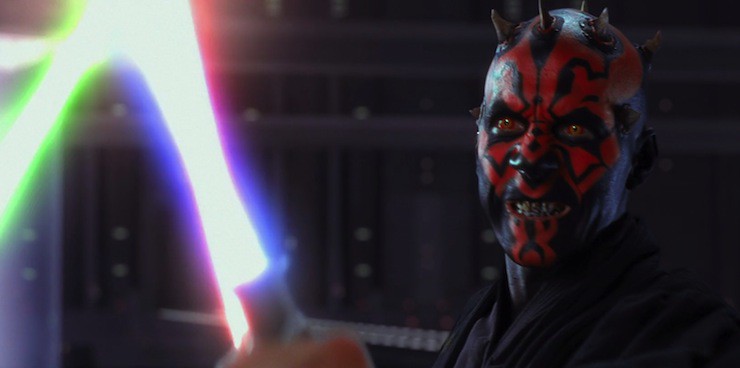Episode VII is bearing down on us like a race car, so a retrospective on the entire series doesn’t seem amiss, right? Starting today, I’ll be watching one movie a week and rereading one novelization a week for maximum retention! Sorry, that sounds like I’m doing a weird digestive experiment. Never mind.
To start, the most maligned of the bunch. And before we all pile on, I wanna really dig into this movie because after rewatching, I find myself far less inclined to anger and the Dark Side in general.
Before we get into the movie itself, a few words about atmosphere, history, and critical analysis:
On my behalf, I am thoroughly dispassionate about judging the prequels in terms of my own level of “betrayal,” as it were. There are fans who are attached to Episodes I-III because they were young when they were released, or because they have fond memories of going to see them, or because they love all Star Wars in every form, and I empathize; no one is wrong to feel that way. But the prequels are still objectively terrible films. It’s an unavoidable truth of the universe. On the other hand, I have zero patience for the fans who say things like “You talked about the prequels like they were canon and, nope, they don’t exist, anyone who likes them is an idiot, THEY RUINED STAR WARS.” Dude, whatever. They’re movies. Whatever mean things you can say about them, they’re also still Star Wars. And as a Star Wars fan, I’ve made peace with them the same way fans make peace with bad television seasons. It’s not the end of the world.
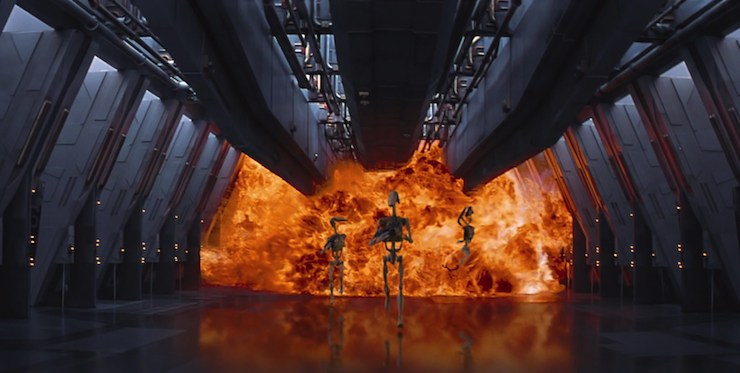
I am deadly serious, here—it’s not that big of a deal. If you think it is, I advise you to sit down at your kitchen table and have a cup of tea every time you feel the urge to throw things/sob/write-another-hate-letter-to-Lucasfilm. (Every time I say something like this, there is an inevitable torrent of fan rage poured out in my direction, which basically proves my point; the prequels are a decade behind us, they don’t deserve this amount of attention—good or bad—for being not-awesome.)
When this movie came out I was only twelve, and being a kid, I adored it. The first new Star Wars movie since before I was born—why would I bother to critique it? I went to the theater dressed up as Obi-Wan Kenobi, with friends dressed as Amidala, Anakin, and Darth Maul. I read every snippet of background given out by companion books and the Star Wars Insider. I was spoiled for the plot (and then some) well before opening night. I had a terrible crush on Ewan McGregor for playing Obi-Wan, and I printed every production still I could find online and stapled them into “promo packets” for myself—one for ships, one for characters, one for locations, and on and on—staring at them before I went to bed each night in anticipation. That year, “Duel of the Fates” played on the MTV music video show Total Request Live, typically sandwiched between TLC’s “No Scrubs” and Ricky Martin’s “Livin’ La Vida Loca.” It was the only time I ever watched the show, and it’s still a bizarre thing to recollect now.
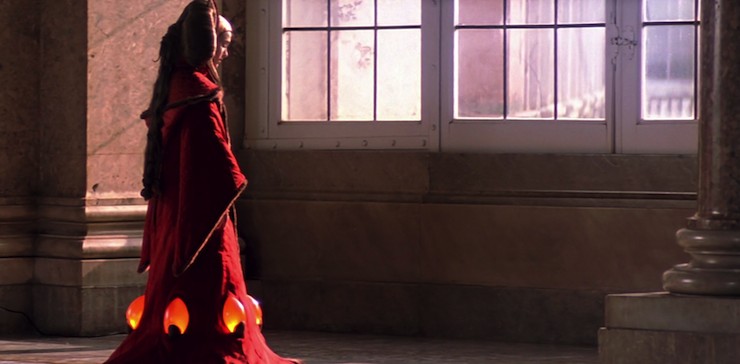
When I got a bit older and gained a better understanding of what constituted quality… I just phased the prequels out of my rotation. These days, I only watch them to jog my memory, which is fine. I have the Clone Wars television series available to be all the things I wanted the prequels to be. Vehemently hating Episodes I-III is counterproductive to me; I will always love Star Wars, and the prequels are still responsible for many things about it that I enjoy.
So I did my best to watch The Phantom Menace with a clear head. And here is what I think of it, fifteen years later:
The cardinal sin of Episode I is that it’s Too. Damn. Long.
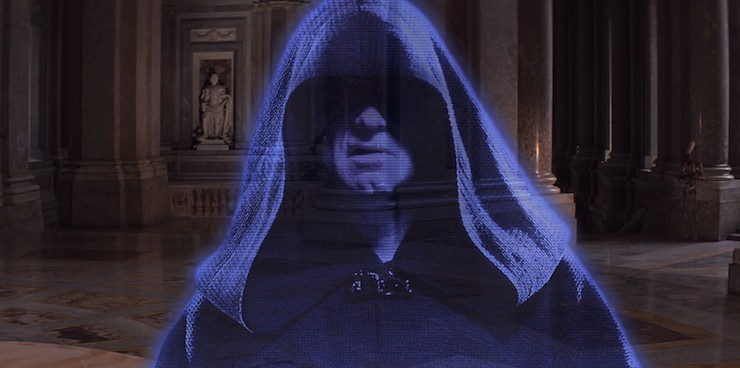
At least an hour could be cut from this film and we would lose nothing. (And yes, I’m aware of the many prequel recuts where this film is shaved down to 5-30 minutes. It’s a common critique all around.) There are too many characters to juggle, and the movie somehow manages to have a dozen sub-acts shoved into the standard three-act structure. People talk SO MUCH. And I’m not one of those people who hates the political aspects of the prequels, I love those parts, but so much of the talking we are forced to listen to is not relevant. Amidala’s plea to the Senate? Cut that whole preamble where the Chancellor is recognizing people’s chairs and whatever. Anakin’s fate at the hands of the Jedi council? Cut the whole scene where they’re testing him and Yoda gives his “Fear is the path to the Dark Side” spiel. Revving up for the pod race? Cut Sebulba’s introduction where he threatens Jar Jar—we can tell he’s evil just fine during the race itself. Also, cut every scene with Darth Maul where he’s not fighting, and cut every scene with Darth Sidious that uses the word “treaty.”
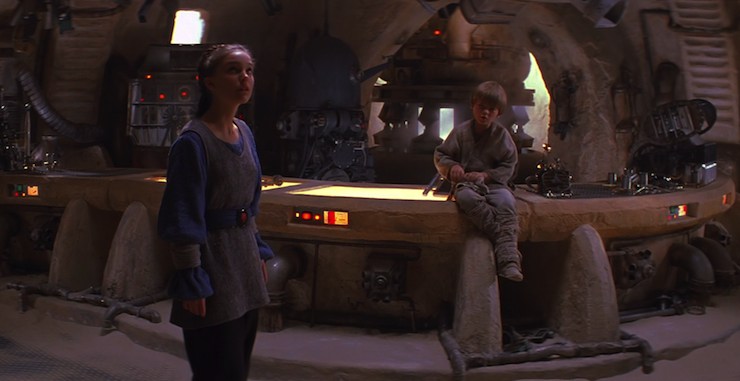
In fact, cut the whole opening sequence, and start the movie with Qui-Gon and Obi-Wan landing alongside the droid army on Naboo. Then the title scroll will have interesting information to give us, instead of “The galaxy is sad about the taxation of trade routes??!?!”
CUT THE DAMN SEA MONSTER SECTION ON NABOO. WHAT IS THIS DOING HERE, IT IS POINTLESS. (Also, Qui-Gon Vulcan nerve-pinches Jar-Jar in that section, and it’s never set up or remarked upon again or reused as a Jedi power, what the hell.)
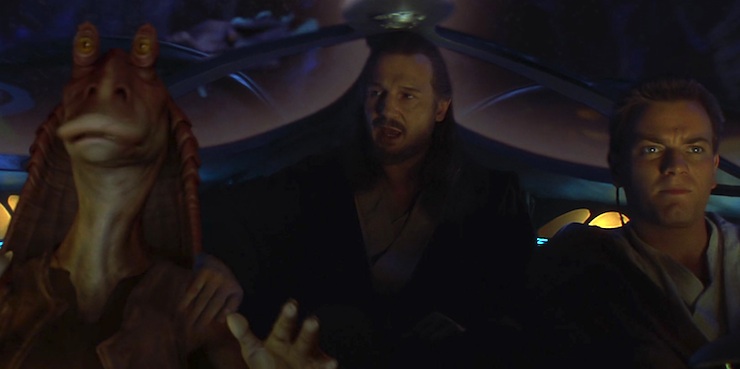
I could really go into the nuts and bolts of why so much of this film should have ended up on the editing room floor, but it boils down to the same thing it always does: no matter how much you love something, more of it isn’t always a good thing. And having so much filler in The Phantom Menace robs this opening chapter of all its gravity. Too many people are explaining the galaxy away, too many monsters are bearing their teeth, too many separate groups are squabbling for us to appreciate what’s supposed to be taking place in the narrative.
More importantly, it distracts the audience from what is actually interesting about the film. We never get the chance to understand why the people of Naboo would elect a fourteen-year-old queen (which is bad storytelling), but the real tragedy is in offering no explanation on the inner workings of a regal ploy where said ruler is surrounded by an entourage of lookalikes who take her place when she needs to do legwork, speak in code in front of strangers to convey information, and are willing to die for her at a moment’s notice. Forget galactic politics—you do not create the bond between Padme and her handmaidens and neglect to exploit that for all its worth. It’s easily its own movie, and that’s without bringing the fact that she’s Luke and Leia’s mother into the mix.
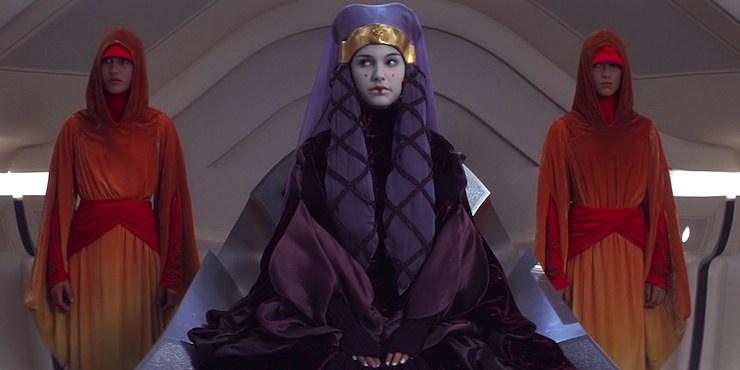
Imagine how different the world would be if the movie had been titled Episode I: The Queen’s War.
There’s also the realization that the intricate galactic politics we observe in the movie have effectively prevented the Jedi from doing their job for untold ages. After listening to Obi-Wan tell Luke about the glory days in the original trilogy, seeing the reality of this era is disturbing; Jedi doing the Republic’s dirty work, unable to help where they are needed, answering to a council that keeps its motives to itself. Qui-Gon is clearly a rogue element, and if the movie isn’t going to focus on Padme and her Magnificant Matching Brigade, then it should most certainly focus on him and his status as one of the few Jedi Masters on the outs with the Council.
No, just watch the one scene where he’s telling the circle of thirteen that Anakin is a convergence of Force Wheaties and that he should be tested for sparkle powers. It’s just a rotation of establishing shots where every Jedi capable of a facial expression is rolling their eyes to space and back. This guy, they’re all saying. He’s at it again. Today it’s the Chosen One, last week it was Midi-chlorian Yoga. If we don’t say yes, he’ll never go away.
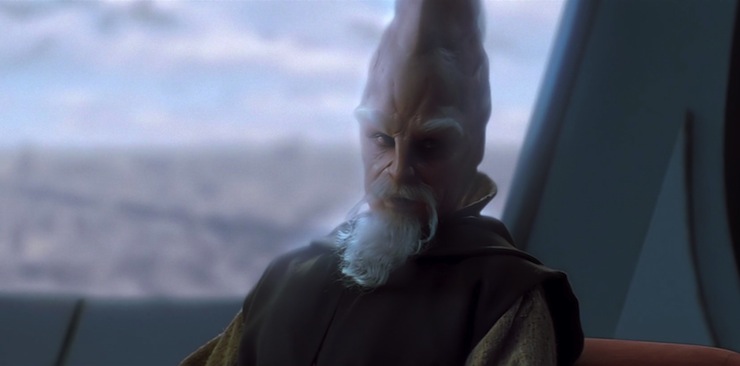
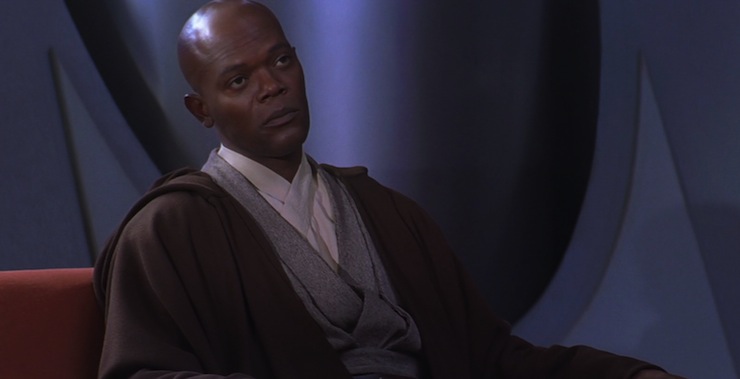
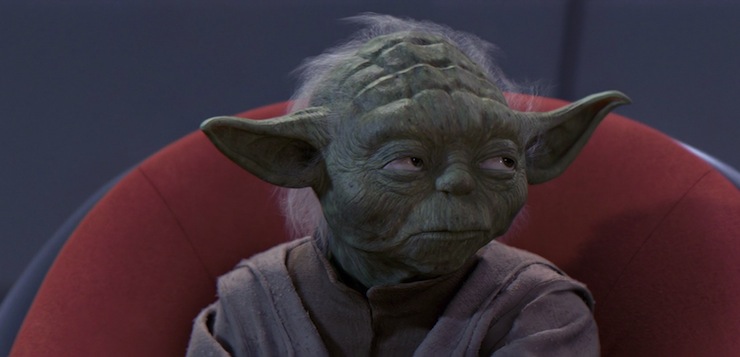
Episode I: The Fate of the Master.
Then there’s the story of Anakin Skywalker’s birth, his childhood as a slave on a backwater world, the ways in which that upbringing will affect his development and create one of the worst tyrants the galaxy has ever seen. Poor Jake Lloyd got such a bad rap from this film, and it’s honestly not his fault; if you’re paying attention, it’s obvious that his dialogue is unreadable and he’s being directed atrociously. It also makes no sense that a fourteen-year-old girl is expressing deep affection for him after spending most of the movie talking about how she doesn’t believe in him, but that’s messy plotting for you. If you avoid all that, you’ve got a solid story to tell about a boy who is already being shaped by destiny and the strange, impartial will of the Force.
And no, he doesn’t have to come off evil for the film to work, no matter how many fans wanted that. (And a lot of them did, it’s still really weird.) The tragedy here is a child who tells Qui-Gon Jinn that he dreamt he was a Jedi who came back to free all the slaves on Tatooine, then growing up and enslaving countless others. A boy who wants to help everyone he meets corrupted by an order that tells him his emotions are wrong for the job.
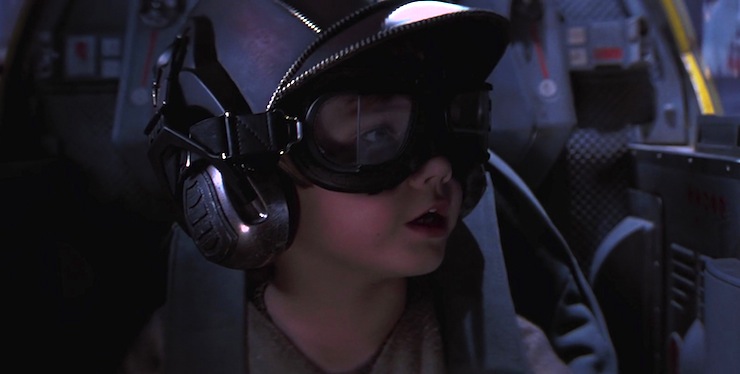
Episode I: The Will of the Force.
There are certain missteps in this movie that are unfixable and it’s too bad that they can’t be scrubbed clean from history altogether. The accents given to the Gungans and the Nemoidians and Watto are straight-up racist no matter how you squint at them—it’s different when you’re looking at the Clone Wars cartoon and practically every species has a different accent, and none of them are portrayed as wholly good or evil. But a movie doesn’t have time to make those distinctions, and it’s impossible not to cringe.
The final act of the film is a raw, choppy mess of a thing. There are no less than four separate threads to follow, and only two of them are immediate enough to warrant our attention; the Queen’s assault on her own palace to arrest Nute Gunray, and the fight between Maul, Qui-Gon, and Obi-Wan. The Gungan battle exists entirely to make bad jokes at the expense of Jar Jar’s entire species, and the attack on the droid control ship is such an exact lift from the attack on the first Death Star that it’s utterly boring to watch. It makes the end of the movie a slog, which is such a shame.
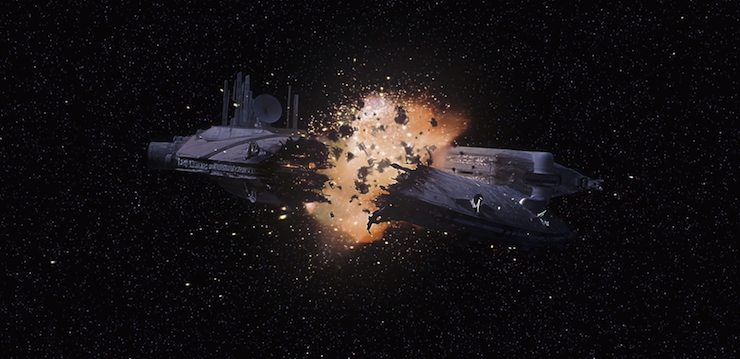
For all that it was such a big deal in 1999 to watch Jedi in their heyday fight with lightsabers, the stunt choreography in this film is remarkably slow. The flow of action these days errs on the ultrafast side, impossible to follow, but this is an awkward opposite to that; when the fight is so easy to track with the eye, it makes every move look over-staged. We’ve already seen the Episode VII upheaval over Kylo Ren’s cross guard lightsaber for being impractical, but on a rewatch, I’d argue that Darth Maul’s double-blade is the worse offense. It’s completely ineffective because he’s using it like a quarterstaff—but quarterstaffs generally can’t cut through people like fake butter spread. The choreography is instantly better in the brief splice after Obi-Wan slices the thing in twain.
Yet even with all these missteps, there are puzzle pieces I can’t help but adore. The pod race is commonly derided, but I enjoyed it more than ever during this watch. It takes up time, sure, but it feels like it belongs in Star Wars even with all the goofy CGI aliens. Queen Amidala’s costume drama, her political theatre, is worth price of admission all by itself. I live for every new headdress, for the beading on each robe. Obi-Wan’s sarcasm, too pronounced in someone so young, is such a smooth contrast to Qui-Gon’s centered gravitas. And while the Duel of the Fates doesn’t seem quite as exciting as it did sixteen years ago, that final act, separated by walls of energy, is another perfectly encompassed story cell that does so much while saying nothing at all. (You could play it on mute without the context of the rest of the film and it would still hurt in all the right places.)
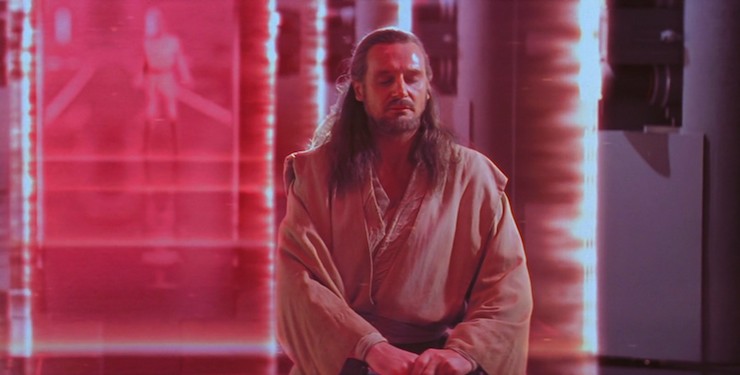
When all is said and done, I keep waiting for fandom to get over Episode I. Because there is too much going on here, too many discussions to be had about craft, about filmmaking, about myth building, and we miss out on them all by screaming into the void the instant the film is brought up. I enjoyed this rewatch, whatever flaws the film has (and it has so very many). And I find it far more rewarding to engage with it, then to throw it out entirely.
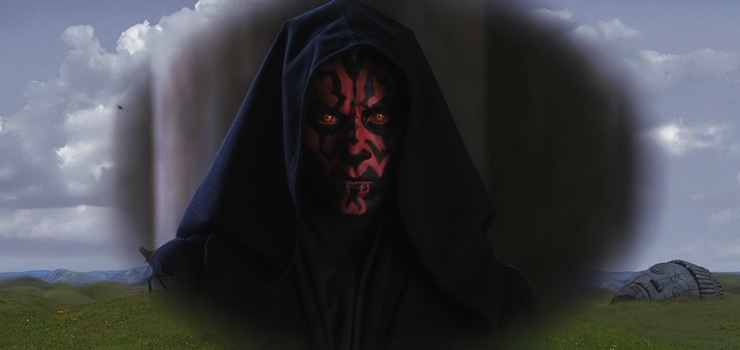
Emmet Asher-Perrin was kind of in love with sarcastic baby Obi-Wan, for real. You can bug her on Twitter and Tumblr, and read more of her work here and elsewhere.










